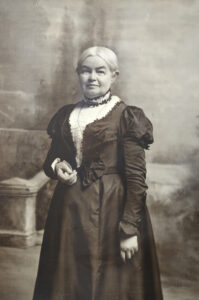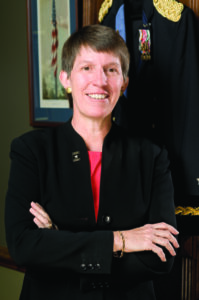Octavia E. Butler
(1947–2006)
In 1995, renowned author Octavia E. Butler became the first science-fiction writer, and one of the first Black women, to receive a MacArthur “Genius” Fellowship grant. The author of several award-winning novels including Parable of the Sower, a New York Times 1993 Notable Book of the Year, and recently a New York Times Bestseller, Butler was acclaimed for her lean prose, strong protagonists, and acute social observations in stories that range from the distant past to the near future. Sales of her books have increased enormously since her death in 2006, as the issues she addresses in her Afrofuturistic, feminist novels have become more obviously relevant. Her life and works have been highly influential in science fiction, the literary world and popular culture, especially for people of color and marginalized communities. Scholars note that Butler’s choice to write from the point of view of characters in these communities expanded the science fiction genre to reflect the experiences of disenfranchised people.
Judy Chicago
(1939– )
Judy Chicago is an artist, author, feminist, educator, and intellectual whose career spans over five decades. She is known for her large-scale, collaborative art installation pieces about birth, creation, and the role of women in history and culture. Her influence goes beyond the art community, as evidenced by her inclusion in hundreds of international publications. A pioneer of feminist art, in 1974 she created her most well-known work, The Dinner Party, produced with the participation of hundreds of volunteers. The historical multimedia installation, a symbolic history of women in Western civilization, has been seen by more than one million viewers during its sixteen exhibitions at venues in six different countries. The piece is now permanently housed in the Elizabeth A. Sackler Center for Feminist Art at the Brooklyn Museum. Chicago is still working and remains active in the public eye. Her first retrospective will open August 28, 2021, at the De Young Museum in San Francisco. Her latest book The Flowering: The Autobiography of Judy Chicago, with an introduction by 1993 NWHF Inductee Gloria Steinem, will be released in July 2021.
Rebecca Halstead
(1959– )
During her nearly three-decade career in the U.S. military, Rebecca “Becky” Halstead achieved multiple historic milestones. In 2004 she became the first woman in U.S. history to command in combat at the strategic level when she was promoted to senior Commanding General for logistics in Iraq. In this role she was responsible for leading over 200 multi-disciplined units, located across 55 different bases, providing supply, maintenance, transportation, and distribution services support to over 250,000 personnel serving in Iraq. Halstead graduated from the United States Military Academy in 1981, a member of the second Academy class that included women. She became the first woman to graduate from West Point and attain General Officer ranking when she was promoted to Brigadier General in 2004. After retiring from military service, Halstead has continued to lead and to serve. In 2010 she founded her leadership consultancy company, STEADFAST Leadership, LLC, which specializes in inspirational and motivational speaking, developing leader-training programs, and coaching and mentoring leaders.
Mia Hamm

(1972– )
Hailed as a soccer icon, Mia Hamm retired from professional soccer in 2004 after seventeen years, two World Championships, two Olympic Gold Medals, all while serving as the face of not merely one sport, but rather an entire generation of athletes. She is remembered as one of the best soccer players in history and one of the most important and recognizable female athletes of all time. In 1987, at just fifteen years old, Hamm was the youngest woman ever to play in a match for the U.S. Senior Squad, the beginning of an illustrious career of firsts. Less than ten years later, in 1996, Hamm played as a forward for the gold-winning, U.S. Women’s National Soccer Team at the Atlanta Olympic Games, the first time women’s soccer was played in the Olympics. Hamm has continued to serve as an inspiration for young girls looking to compete in athletics. She has maintained an active presence within the soccer community and has served as an outspoken advocate for Title IX and gender equality.
Joy Harjo
(1951– )
A member of the Mvskoke Nation, Joy Harjo is a multidisciplinary artist: a poet, musician, playwright, painter, and author. In her works, Harjo draws on First Nations storytelling and histories, as well as feminist, indigenous, and environmental and social justice poetic traditions. Her poetry often centers around the need for remembrance of ancestral lands and culture, and the power of language and song to return us to a balance with the earth and her peoples. Harjo is the author of more than nine books of poetry, including An American Sunrise, two memoirs, Crazy Brave and Poet Warrior, several children’s books, plays, and literary anthologies. She also performs internationally with her saxophone and flutes and has produced seven music albums. Her works have connected with audiences around the world, garnering praise and critical acclaim. Harjo is a founding board member and chair of the Native Arts & Cultures Foundation, a Chancellor of the Academy of American Poets, a member of the American Academy of Arts & Letters, and is the 23rd Poet Laureate of the United States, the first Native American to hold this honor. For her signature project as the 2019-2021 U.S. Poet Laureate, Harjo gathered the works of contemporary Native poets into a fully digital map titled, Living Nations, Living Words.
Emily Howland

(1827–1929)
Known for her activism and interest in education equality, women’s rights, and the temperance movement, Emily Howland was a formidable woman. Born in 1827 to a family of the Society of Friends in Sherwood, NY, Howland’s valuing of human equality was encouraged by her father, Slocum, an Underground Railroad stationmaster. Throughout her life, Howland practiced the teachings of the Quaker community and continued to actively fight for equality. An ardent abolitionist, she taught at the Normal School for Colored Girls (now University of the District of Columbia) in Washington, DC from 1857 to 1859. Throughout the Civil War, Howland worked at multiple refugee settlements where she taught formerly enslaved people how to read and write, and cared for the sick during a smallpox outbreak. Following the war, Howland purchased a plot of land called Arcadia in Heathsville, VA, to settle families she had befriended in the camps. She founded the Howland Chapel School, supporting the school along with nearly fifty other African American schools throughout the American South. During the remainder of her life, Howland became widely recognized as a pioneer and leader in the women’s suffrage movement, serving as a spokesperson at the 1894 NY State constitutional convention, and before the United States Congress. Though her friends from the first generation of the suffrage movement had since passed, Howland was able to cast her vote in 1920. Until her death at the age of 101, Emily Howland served as the director of the First National Bank of Aurora in Aurora, NY. She was one of the first women to become the director of a national bank in the United States.
Katherine Johnson
(1918–2020)
NASA mathematician, pioneer in racial and gender equality, and contributor to one of our nation’s first triumphs in human spaceflight, Katherine Johnson is remembered as one of America’s most inspirational figures. In 1939, two years after graduating from the historically Black university West Virginia State University, Johnson was one of three Black students handpicked to integrate West Virginia University’s graduate school. This was just the beginning of a career full of firsts for her. Johnson went on to work at what is today known as NASA’s Langley Research Center in Hampton, VA, and was a key mathematician whose calculations of orbital mechanics were critical to the success of the first and subsequent U.S. crew spaceflights. After 33 years at Langley, she retired but was nowhere near leaving the spotlight. In 2015, President Barack Obama awarded her the Presidential Medal of Freedom, and in 2019, a bipartisan team of Senators awarded her the Congressional Gold Medal of Honor–two of America’s highest civilian honors. In 2016 she was portrayed by actor Taraji P. Henson as the lead character in the critically acclaimed film Hidden Figures. After her death in 2020 at the age of 101, Johnson’s legacy was described by former NASA Administrator, Maj. Gen. Charles Bolden: “Katherine’s legacy is a big part of the reason that my fellow astronauts and I were able to get to space… it’s a big part of the reason that today there is space for women and African Americans in the leadership of our nation, including the White House.”
Indra Nooyi
(1955– )
As a business executive and the former Chairman and CEO of PepsiCo, Indra Nooyi has consistently ranked among the world’s most powerful people. During her tenure at PepsiCo, the company grew its net revenue by more than eighty percent, and PepsiCo’s total shareholder return was one hundred and sixty-two percent. Under Nooyi’s leadership, PepsiCo expanded significantly, acquiring Tropicana Products, Inc., merging with Quaker Oats Company and PepsiCo’s anchor bottlers, and acquiring the Russian company Wimm-Bill-Dann Foods, resulting in the largest international acquisition in PepsiCo’s history. In addition to her business success as CEO, Nooyi was the chief architect of Performance with Purpose, PepsiCo’s pledge to do what’s right for the business by being responsive to the needs of the world. This pledge included delivering more nutritious products, limiting the company’s environmental footprint, and empowering its associates and the people in the communities PepsiCo serves.
Michelle Obama
(1964– )
Advocate, author, lawyer, and 44th First Lady of the United States—the first Black person to serve in the role—Michelle Obama has emerged as one of the most influential and iconic women of the 21st century. During her time in the White House, from 2009-2017, she established herself as a strong advocate for women and girls in the U.S. and around the world. As First Lady, she created: Let’s Move!, a program aimed at ending childhood obesity; the Reach Higher Initiative to help students navigate and better understand job opportunities and get the education necessary for these jobs; Joining Forces, an initiative she co-led with Dr. Jill Biden to support military veterans, service members, and military families; and Let Girls Learn, a program to support adolescent girls’ education around the world. During her eight years as First Lady, Obama helped create the most welcoming and inclusive White House in history, transforming the White House into the “People’s House.” Since leaving the White House, she has continued to have a profound public impact. Her deeply personal memoir Becoming, released in 2018, has sold over 15 million copies, been printed in 24 languages, and won the 2020 Grammy Award for Best Spoken Word Album. Following the success of her book, in July of 2020 she premiered The Michelle Obama Podcast, which features the former First Lady alongside friends and loved ones as they dive into conversations about the relationships that make us who we are. Both in and out of the White House, Michelle Obama has accomplished her initiatives and so much more—becoming an advocate for healthy families, service members and their families, higher education, international adolescent girls’ education, and serving as a role model for women and young girls everywhere.
DISCLAIMER: The views, beliefs and opinions expressed by Inductees do not necessarily represent the views, beliefs and opinions of the National Women’s Hall of Fame, its members, affiliates, Board, donors, volunteers, sponsors, or attendees.







